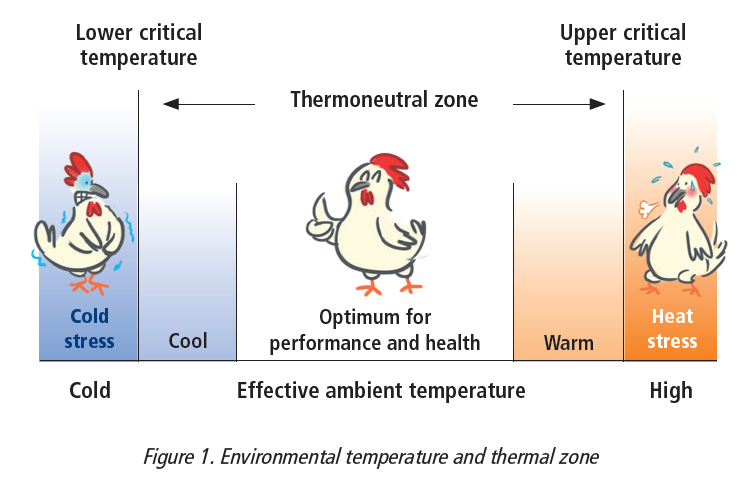Ambient temperature and relative humidity are two of the most important environmental factors for animal productivity and welfare. Despite advances in cooling technologies and strategies heat stress, the inability of animals to properly reduce thermal energy produced, continues to represent a serious health concern. When animals are exposed to temperatures that are higher than the comfort zone (16-25°C), they will experience heat stress (fig. 1). This causes an imbalance in antioxidant status and an increase in oxidative stress. It disturbs the cellular function and has a deleterious effect on the animal’s health and welfare, resulting in huge economic losses.

There is evidence to support that during heat stress the levels of oxidative stress at a cellular level get increased. Therefore, antioxidant nutrient supplementation can be used to protect tissues from lipid peroxidation and attenuate the negative effects of this environmental stress. It has been shown that vitamin C acts as an antioxidant and counteracts heat induced effects. Moreover, Vitamin C has proven immunostimulatory effect and protects against infections, in particular those found in the upper respiratory tract. Therefore, it has become common industry practice to apply natural vitamin C to the diet of the animal.
However, vitamin C is unstable when mixed with other ingredients and this is worsened when vitamin C is mixed with water as it oxidizes instantly. In addition, vitamin C is sensitive to a variety of environmental factors including heat, oxygen and alkalinity. Thus, any natural vitamin C in raw materials is unlikely to remain bioavailable for long periods of time. The same applies when unprotected vitamin C is used as an additive.
Researchers at Innovad have developed a stable non-ionic, long lasting form of Vitamin C with higher efficacy as an anti-oxidant and immune stimulator for animals.
A study to check the stability of Innovad’s Vitalite C12 has been recently performed.
Methodology:
A control sample (common industry practice: Vitamin C dissolved in water) was prepared together with a sample of Vitalite C12. Both samples were stored at room temperature (20°C) for 1 year.
Aliquot samples were removed from the control sample and analyzed for the content of Vitamin C (ascorbic acid) at 0, 1, 2, 3, 6, 9 and 12 months of storage. Vitalite C12, was only analyzed at 0 and 12 months of storage.
The study quantified the percentage of Vitamin C (ascorbic acid). Vitalite C12 has a density of 1,2 kg/liter and 10% of Vit. C equaltes to 120,000 mg of Vitamin C per liter.
Results:
| Month at RT (20°C) | 0 | 1 | 2 | 3 | 6 | 9 | 12 |
| Control Sample | 10.00% | 9.58% | 9.12% | 9.00% | 7.76% | 7.05% | 6.13% |
| Vitalite C12 | 10.00% | N/A | N/A | N/A | N/A | N/A | 10.00% |
Vitalite C12 suffered no losses even after 1 year of storage in real conditions. The test confirms Innovad’s advanced formulation of Vitalite C12 with enhanced stability and no losses in activity.
Vitalite C12: A proven stable solution for the alleviation of heat stress in farm animals.